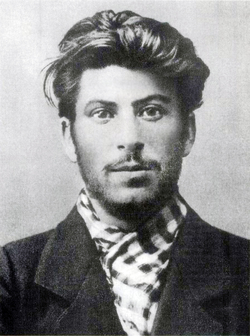One reason gamification is attractive to businesses is the potential for motivating behavior using rewards other than cash. Frequent-flyer miles, coupons, and credit-card Rewards Points can successfully motivate behavior, but in the normal market-economics way: you encourage desired behavior by spending money. Is there a way to do this without actually paying out money? Gamification promises an alternative: if game mechanics can motivate behavior, perhaps we can get the effects of rewards without actual payment. Instead of giving users a $5 credit for exploring our webapp, or redeemable points for their loyalty, can we set up some sort of game where we in effect give them some combination of achievements, points, and badges instead?
"Socialist competition"

V.I. Lenin, gamification consultant
Phrased that way, it sounds like a problem a certain Vladimir Lenin was facing in 1917: How do we motivate workers, without resorting to paying them based on their work?
Part of his answer was a theory of "socialist competition", in which factories and individuals were to compete against each other within systems that bear greater or lesser resemblance to game mechanics, and success at the game is symbolically rewarded. A factory might be awarded points for its performance, and win commendations as it surpasses various point thresholds. Teams building a bridge could compete to see which side progresses fastest. Borrowing a symbolic-motivation strategy long used by armies, particularly productive factories or workers might be awarded a medal like the "Order of the Red Banner of Labor".
Here you might object: yes, bad gamification can be like that, but good gamification is about user engagement, not just about setting up a sham market, where we've replaced the real money with shiny badges and hope nobody notices.
And, indeed, that was an objection levied at socialist competition as well. Opponents from the left complained that communism was supposed to reduce workers' alienation, with monetary motivation replaced by a real engagement with one's work. Just replacing money with bridge-building games, giant commendation banners, and shiny badges was, they alleged, some kind of bizarro-world capitalism with payment in trinkets, more than it was communism. In one anecdote (p. 79), a carpenter and veteran Soviet partisan complained that he was happy to work as much as he could to build the new socialist country, but it was nobody's business to tell him how to work, or line him up in competition against another carpenter.

J.V. Stalin, gamification consultant
In response, Lenin and later Stalin emphasized that "socialist competition"
really was supposed to be about real engagement, not just a sham
reenactment of capitalism; it was even eventually renamed
"socialist emulation". Many of their arguments along those lines actually sound
fairly modern in gamification. Points and banners were not payment, but
just encouragement and recognition for engaged users workers, providing
some indication and acknowledgment of progress, along with a fun and comradely
way to guide workers towards where they should be going next, all while
building community. Workers were even encouraged to engage in more leisurely
gamification not directly related to production, with scope for "end-user
creativity": one factory held a competition (p.
194) among divisions to "elevate the cultural level of the workers", with
entries including a division that decorated its work area with artificial palm
trees.
Some of the attempts arguably even went more towards real game-like engagement than any modern gamification has tried. Factory competitions could blend fuzzily into sports competitions: factories would not only compete against each other in production, but would also field teams to compete against other factories in Soviet soccer leagues. This attempted to leverage genuine game competition, together with cultural aspects like local city pride and sports fandom, as part of an attempt to gamify industrial production, a particularly ambitious strategy.
Why does this matter?
Of course, the Soviet economy is not widely held up as a model of success. But the comparison isn't really intended to say that since "socialist competition" failed, gamification is also crap. The more thoughtful gamification advocates are quick to point out that gamification isn't some kind of magic pixie dust you can sprinkle on anything and magically get success; so it's no surprise that the fundamentally broken Soviet model of industrialization wasn't saved by gamification, even if it were really brilliantly executed gamification (which in many respects it wasn't).
Instead, the point is that we can and should learn something from the long history of deploying game-like mechanics outside entertainment. I'm no expert on Soviet competition, but many people are, and a lot of interesting stuff has been written on its successes and failures, and what that teaches us about deploying different kinds of reward systems and game-like approaches to motivation. The lessons hardly stop with the Soviet Union, either: the history of using game-like approaches to business and motivation is quite long. As just one example, there has been a lot of experimentation with using games and competition internally in large Western corporations, partly to address similar problems (a very large corporation starts to look internally a bit like a top-down command economy).
Further afield, there's been much experimentation with rewards systems in areas like education and behavior modification. Terms like "brownie points" and "gold star" have even entered the general lexicon as metaphors, but experimentation with them wasn't all as simplistic as sometimes assumed. When I read an article about a professor experimenting with using "points" and "level-ups" in his or her course, I wonder why we aren't talking about research into systems of awarding points and having achievement thresholds in education dating back decades, even if they weren't called "level-ups". And how does this relate to the more competition-based angle of educational gamification, like the International Mathematics Olympiad?
Or: When we're discussing using game-like mechanics to do things like encourage exercise, perhaps we could also read from the large body of research in areas like cognitive behavioral therapy, which includes a lot of thinking on quite relevant questions, such as how to use extrinsic interventions in a way that guides a user towards intrinsic motivation, rather than making them dependent on Skinner-box-like motivational approaches (which can encourage dependence, can have tolerance effects, and may not produce lasting behavioral change).
* * *
Gamification often presents a recent origins story: For many years, the story goes, game mechanics have been used only in entertainment, where they've been wildly successful in engaging users. Why don't we try to apply them to more serious endeavors?
If it were just an issue of historical credit and the name, that's fine; people rebrand old things all the time. But the claim that we've never explored using game-like mechanics for non-entertainment purposes keeps us from using knowledge we actually have: gamification's rhetoric claims that this is a new, unexplored space in which we're just learning things for the first time. But in fact we already know a lot of things about how gamification works and doesn't work, and have done a lot of thinking about the relationships between things like extrinsic motivation, intrinsic motivation, and gameplay, and pretending that we don't know any of that isn't a good way to make progress.
I mostly ignored gamification for a while, considering it a brief marketing trend. But if it's here to stay, perhaps we ought to retroactively broaden it, and include things like "socialist competition" as an experiment in gamification worth learning lessons from. And of course, that isn't incompatible with also drawing new mechanics from entertainment-oriented games to experiment with in other contexts.
Incidentally: It took all of my willpower not to title this essay, "In Soviet Russia, Gamification Engages You".
Published version: A version of this essay, also including discussion of American precursors to workplace gamification, is available as: Mark J. Nelson (2012). Soviet and American precursors to the gamification of work. In Proceedings of the 16th International Academic MindTrek Conference, pp. 23-26.